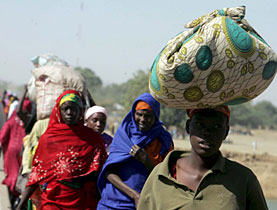
“More effective” policy to aid fewer countries

The Swiss Agency for Development and Cooperation (SDC) has released a trimmed-down list of priority countries and regions earmarked for development assistance.
Switzerland’s foreign aid arm is planning to drop five states – Ecuador, Peru, Bhutan, Pakistan and India – from the list for 2009-2012.
The decision follows a government review of the country’s foreign development strategy, which it on Tuesday said must be made “more effective”.
The pared-town list of target countries, released by the SDC, includes seven African states: Chad, Mozambique, Tanzania, Benin, Burkina Faso, Mali and Niger.
The latter four are in West Africa and rank at or near the bottom of the United Nations Human Development Index.
Also receiving aid will be Bangladesh, Nepal and the Mekong region in Southeast Asia, which encompasses Vietnam, Laos, Cambodia and Myanmar. Bolivia and Central America will benefit too.
The announcement is the second reduction in priority countries or regions. In 2003, the number was lowered from 24 to 17.
Reduction strategy
The SDC’s updated mandate follows a binding motion passed by parliament requiring the development agency to place more of its focus on Africa, home to the overwhelming majority of the world’s poorest states.
A media release by the foreign ministry characterised Tuesday’s plan as part of what the government calls a “unified strategy” – reducing poverty, reducing security risks and promoting development.
To that effect, the federal cabinet has submitted a four-year, SFr4.5 billion budget to parliament for approval. The allocation to the SDC represents almost 65 per cent of that figure, according to foreign ministry documents.
But Alliance Sud, Switzerland’s association of non-governmental organisations, is not impressed with the announcement.
It says the most noticeable reduction, at least over the past two years, has been in the government’s own development budget.
It says that while the government has repeatedly pledged to raise its aid budget to 0.7 per cent of the country’s gross domestic product (GDP), the humanitarian coffers are actually shrinking.
No budget discussions
“Basically, what has happened in the last two years is that aid sank, and not only as a percentage of GDP, but also in real francs,” Michèle Laubscher, Alliance Sud’s coordinator for development policy, told swissinfo.
Foreign ministry spokesman Lars Knuchel says that while Switzerland’s development allocation may be subject to “eventual change”, there has been no talk of a timeline or official discussion about matching the budget to previous commitments.
The country’s aid organisations aren’t holding their breath. Alliance Sud has launched a petition to boost aid to the promised 0.7 per cent level, but admits the prospects of success are slim.
It would mean year-over-year increases of 12 per cent until 2015, Laubscher said.
A total increase of 25 per cent – from 0.4 per cent of GDP to 0.5 per cent – is more realistic, the group believes.
swissinfo, Justin Häne
Switzerland has a long history of cooperation with most of the 12 countries or regions listed as part of its revised development strategy. Nepal, for example, has received assistance since the 1950s.
India a 51-year member of the club, was left off the list. It has also made monumental economic and political strides over the same period.
The Swiss Agency for Development and Cooperation rarely, if ever, operates alone.
Apart from its international partners, it has often worked alongside the State Secretariat for Economic Affairs (Seco).
The SDC focuses on poorer states; Seco has gravitated towards middle-income countries.
It has dropped Mozambique, Burkina Faso, Tanzania, Nicaragua and Bolivia in favour of Indonesia and Columbia.
The Swiss government has said its development policies rest on “the principles of humanity, solidarity and fairness as well as a desire for peace and a sustainable future”.

In compliance with the JTI standards
More: SWI swissinfo.ch certified by the Journalism Trust Initiative

























You can find an overview of ongoing debates with our journalists here . Please join us!
If you want to start a conversation about a topic raised in this article or want to report factual errors, email us at english@swissinfo.ch.